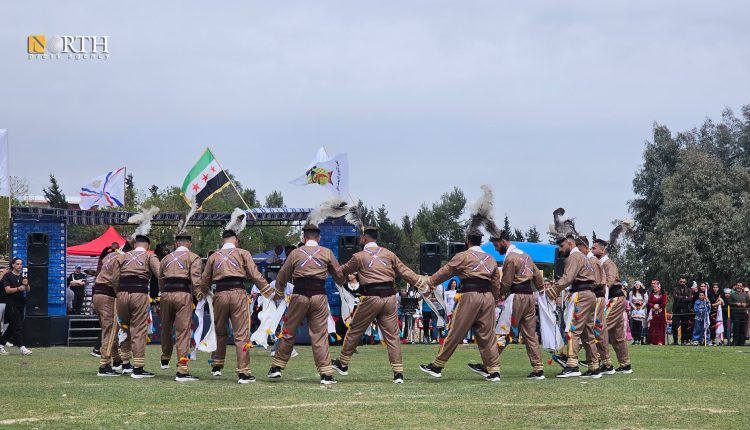Assyrians Celebrate Akitu Festival in Northeast Syria
By Kardo Roj
HASAKAH, Syria (North Press) – Hundreds of Assyrians celebrated the Babylonian-Assyrian New Year, known as “Akitu,” across several regions in the countryside of Hasakah and Qamishli on Tuesday.
The festival, which falls on April 1 each year, is one of the oldest recorded celebrations in Mesopotamian history. Akitu has been observed for thousands of years, marking the renewal of life and the arrival of spring.
Cultural and Community Participation
The celebrations in northeast Syria saw participation from delegations representing the Autonomous Administration of North and East Syria (AANES), along with various community, political, and religious figures. Events took place across Hasakah city, its countryside, and rural areas of Qamishli.
The festivities included traditional Assyrian folk dances, musical performances, and cultural exhibitions reflecting the rich heritage of the Assyrian people. Participants dressed in traditional attire, engaging in group dances and performances that symbolized themes of renewal and unity.
Historical and Philosophical Significance
Akitu is a deeply symbolic event for the Assyrian people, representing themes of renewal, freedom, and the enduring connection between humanity and nature. The festival’s origins date back to the earliest civilizations of Mesopotamia, including the Sumerians, Babylonians, Akkadians, and Assyrians. Historically, the festival lasted twelve days and was central to the cultural and religious identity of ancient Mesopotamian societies.
Bashir Saadi, deputy head of the Assyrian Democratic Organization, highlighted the festival’s global importance: “Today, Assyrians around the world celebrate the Babylonian-Assyrian New Year, which this year marks 6775. Akitu is a festival of freedom and the renewal of life.”
He noted the similarities between Akitu and Nowruz, the New Year festival celebrated by Kurdish communities, emphasizing the region’s shared cultural heritage. “The celebrations begin on March 21 and culminate on April 1,” he added.
Celebrating Amid a New Era
Ninos Esho, head of the Executive Committee of the Assyrian Democratic Party, reflected on the significance of this year’s celebrations: “This year, we celebrate in an atmosphere of greater freedom following political changes in Syria. Our festivities carry the legacy of our ancestors while looking forward to a future Syria that is inclusive of all its components—a democratic, secular, and decentralized Syria.”
The festival continues to serve as a reminder of the deep-rooted cultural traditions of Assyrians, Syriacs, and Chaldeans in Syria, Iraq, and southeastern Turkey. While its historical origins date back to the First Babylonian Dynasty, Akitu remains a vibrant and cherished celebration for Assyrian communities worldwide.
As Assyrians in northeast Syria mark another year of Akitu, the celebrations reflect both the resilience of their cultural identity and their aspirations for a future that respects and embraces Syria’s diverse ethnic and religious communities.

